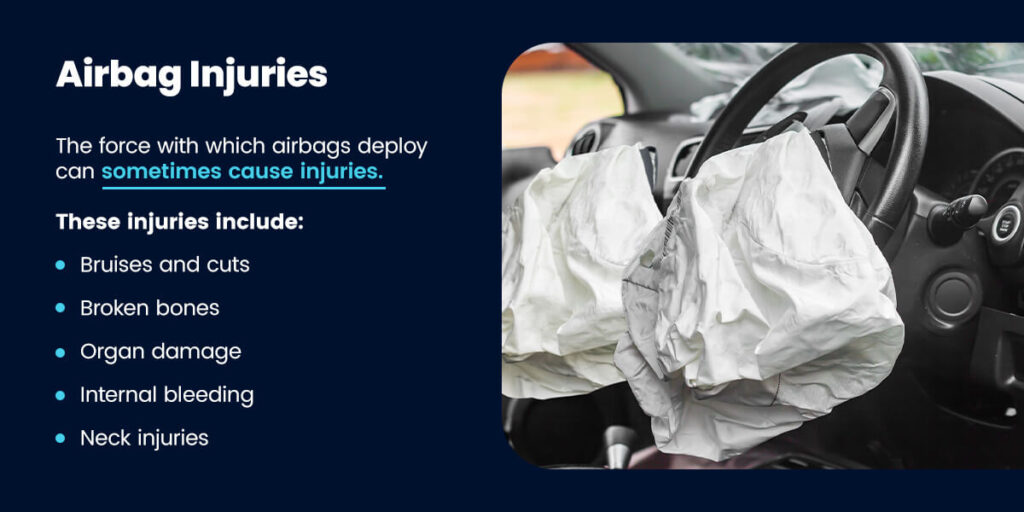
After a car accident, you may feel sore all over your body. Whiplash and concussions are common injuries in car wrecks. However, some also experience chest pain after an auto accident. You might experience discomfort right away, or symptoms may appear a little while later.
Chest pain can be caused by broken ribs, injury to your internal organs or other serious injuries. If you’re experiencing chest pain, immediately see a medical professional who can help you understand your symptoms, offer a diagnosis and begin treatment. While some causes of chest pain aren’t serious, others can be life-threatening — seeing a trusted doctor will bring you greater peace of mind and ensure your body gets the care it deserves.
After you’ve been in an accident, it’s normal to have sore muscles all over your body. If you’ve experienced a sudden impact, you may have whiplash symptoms, including tender muscles in your neck, shoulders and chest.
Most of these ailments will go away with time, although you can speed up your recovery with the treatment. However, if you experience any of the following symptoms, you need to see a medical professional:
These signs could mean that you have internal organ damage or other serious injuries. You need a medical professional to diagnose and treat the underlying issues for a good outcome. If you’re experiencing some of these symptoms after an accident, don’t wait — contact a doctor today to get checked out.
Most people do not have a heart attack after a car accident. However, here are the primary symptoms so you can recognize them just in case:
Some people, usually women, may also feel nauseous, tired or light-headed before a heart attack. If you believe you’re having heart attack symptoms, call 911 immediately. Don’t wait to see if your symptoms get worse — the faster you get treatment, the better.
Sometimes, chest and sternum pain after a car accident can be caused by the protective mechanisms in your car — your airbags and seat belt. These features are designed to protect your life by breaking the force of impact. However, they can cause broken ribs or other injuries while preserving your life.
Here’s more about the negative impact your seat belt and airbags can have during a collision.
It’s much safer to be wearing a seat belt when in a car wreck. However, this mechanism can cause injuries like:
To avoid seat belt injury, adjust it so it’s not too tight. You should always wear it down around your hips instead of directly across your stomach. Although seat belts can cause serious injuries, failing to wear them properly can lead to much worse consequences.

Airbags are designed to inflate immediately when an impact occurs, protecting you from hitting the inside of your vehicle or anything else during a collision. However, the force with which airbags deploy can sometimes cause injuries. These injuries include:
Children are more likely than adults to be injured by airbags during an accident. That’s why not letting any child under 13 sit in the front seat is advised. Because children are generally shorter than adults when they sit down, the airbag can direct too much force on their bodies.
As an adult, the best way to prevent airbag injury is to wear your seat belt. That way, you aren’t propelled into your airbag by the crash as it’s rapidly expanding.
People often experience an adrenaline rush in a car accident. This chemical change acts as a natural painkiller, so your focus is narrowed and you can handle danger in the present moment. After the adrenaline wears off, the pain of your injuries often starts surfacing.
It can take days to weeks for every injury to present itself. For example, inflammation can cause pain as your body heals itself. You may also experience delayed chest pain from internal bruising. Damage to internal organs may not cause pain until the situation has had time to get worse.
Signs that your delayed pain is serious include:
Because not every injury is painful right away, being thoroughly evaluated by a medical professional after an accident is important. With the right care, you can understand your physical condition and deal with injuries before your body tells you about them.
Before you can appropriately treat chest pain, you must understand its root cause.
Here’s how an injury doctor can help you heal chest pain after an accident:
Calling a doctor is the most important thing you can do if you’re experiencing chest pain. Once a medical professional examines you, they can help you create a plan of care that’s right for your injuries and lifestyle needs. Never ignore these ailments or rely solely on over-the-counter pain medications.
At Complete Care, we offer affordable injury care for residents of Florida. It’s our mission to make injury care accessible for you — we offer telehealth appointments, walk-ins and same-day appointments to accommodate as many people as possible. At our clinic, you can access everything from diagnostic services to neurology and chiropractic care.
Request an appointment today and see a doctor for chest pain after an accident!

The information provided on this website does not, and is not intended to, constitute legal advice; instead, all information, content, and materials available on this site are for general informational purposes only. Information on this website may not constitute the most up-to-date legal or other information. This website contains links to other third-party websites. Such links are only for the convenience of the reader, user or browser.